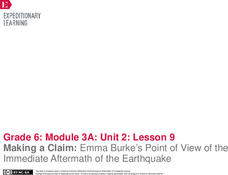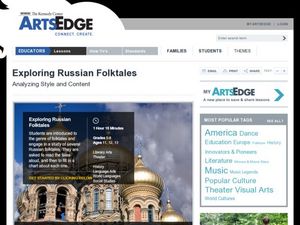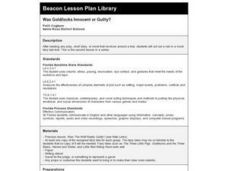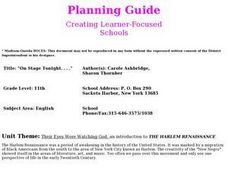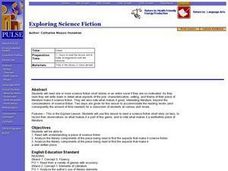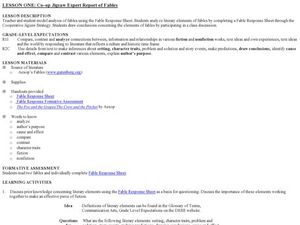Curated OER
Text Elements—Vampires
Learners explore the tone and style of passages from horror genre literature. In this literary elements lesson, students read The Vampire by John Stagg and the War of the World script by H.G. Wells, Learners write about the way the...
Curated OER
Lesson 2: Fiction
What makes a book fiction or nonfiction? Kindergartners discover ways to find out if a book is real or made up. They examine a fictional picture book as a group and decide what clues help them decide. There is an independent worksheet...
Curated OER
Lesson 3: Character Values
A value is something a person or character thinks is right or good; it's also a characteristic of a fairy tale. Learners discuss how fairy tale characters often have or exemplify a specific value. They compare the values found in The...
EngageNY
Making a Claim: Emma Burke’s Point of View of the Immediate Aftermath of the Earthquake
Sharpen those pencils; it's time to write! Scholars begin writing the first body paragraph of their literary analysis essays. Additionally, pupils use graphic organizers to analyze a character's point of view from Laurence Yep's...
EngageNY
Making a Claim: Moon Shadow’s Point of View of the Immediate Aftermath
Body paragraphs are the building blocks of every essay. Pupils view and discuss a model essay using a rubric to evaluate one of its supporting paragraphs. Next, scholars use what they've learned to continue drafting their own literary...
Curated OER
Exploring Russian Folktales
Students examine Russian Folktales. In this folklore lesson, students discuss the attributes of common folktales they know and then discover details regarding Russian folktales. Students read 3 folktales and then complete the provided...
Curated OER
Was Goldilocks Innocent or Guilty?
Fourth graders act out a mock fairy tale trial. They use a fairy tale like "The Three Little Pigs", "Goldilocks and the Three Bears", "Hansel and Grete"l, and/or "Little Red Riding Hood".
Curated OER
The Important Thing About Reading
Third through fifth graders discover the importance of reading and plan a service project to provide books to children. First, they read the book The Important Book and then they brainstorm about the importance of reading. Afterward,...
Shakespeare Uncovered
All the Globe’s a Stage: Shakespeare’s Theatre
“All the world’s a stage,” exclaims Jaques in As You Like It, but it is the structure of the Globe stage and how that structure influenced Shakespeare’s plays that is the focus of an on-line research project. Class members visit a series...
Curated OER
Analyzing Folklore: Redwall
Brian Jacques’ novel Redwall provides the focus for a series of lessons involving the analysis of folklore. Adopting the persona of a character, groups write letters in the voice of their character, assemble a collage using Microsoft...
Curated OER
On Stage Tonight . . .
Eleventh graders explore the World Wide Web for information concerning the period known as "The Harlem Renaissance." They study the contributions made by African Americans in the areas of literature, art, and music during this period in...
Curated OER
The Individual and His Role in Society
Tenth graders discover how various writers approach the themes of : alienation and solitude, living life "deliberately" and "phonies." Through reading, journaling, class discussion, and writing assignments they realize the power of the...
Curated OER
Exploring Science Fiction
Twelfth graders read a variety of science fiction short stories. Using the text, they identify the components that make it science fiction and a well written piece of literature. They record their observations and share them with the...
Curated OER
You Are What You Read
Sixth graders select a prose, poetry, or nonfiction excerpt from a book of their choice and share it by reading aloud to their classmates, who identify the genre and respond to related questions in their journals.
Curated OER
Identifying Science Fiction
Students discuss works of science fiction that they read, highlight aspects that made each a part of science fiction genre, identify formal literary elements, and discuss ways each can be developed through science fiction.
Curated OER
How Tragic!
Students study and interpret a classical tragedy and role play a character from the play. In this tragedy lesson, students discuss a specific work to discover the form, structure, and characteristics of the genre and interpret the...
Curated OER
Writers and the Old South Myth
Young scholars are introduced to authors of the South. In groups, they compare and contrast the pastoral and counter pastoral traditions present in some forms of Southern literature. They use a database to examine the covers of the...
Curated OER
Fantasies and Myths
Fourth graders listen to the book, THE GIVING TREE and discuss what genre category they believe the story fits into and why. They read of of the myths on the website on the computers and then come back together as a group and discuss...
Curated OER
Crane, London, and Literary Naturalism
Young scholars identify the key characteristics that comprise American literary naturalism in Jack London's "To Build a Fire" and Stephen Crane's "The Open Boat." In this naturalism analysis lesson, students identify characteristics of...
Curated OER
Cinematic Poetry
Eighth graders explore the genre of poetry through the creation of a multimedia presentation. Students write a poem and create an Avid presentation of their poem for the class. The poems and presentations are peer-reviewed.
Curated OER
Author Study
Learners examine and identify the characteristics of the different genres of literature. After being read and reading various stories, they identify how different books by the same author carry the same story elements. They discuss how...
Curated OER
Fantasy, Fables, Myths, Legends & Fairy Tales
Students identify the differences between fantasies, fables, myths, legends and fairy tales. In groups, they create their own versions of the different genres. They practice identifying the examples, as well.
Curated OER
The Odyssey
Students write a dramatic scene based on The Odyssey and perform it for the class. In this living literature lesson, students work in small groups to discuss the way the characters look, act, and sound. They then choose scenery and...
Curated OER
Cooperative Jigsaw Expert Report of Fables
Students research literary elements of fables. In this literature instructional activity, students analyze literary elements of fables. Students work collaboratively using a jigsaw strategy to analyze literary elements.





